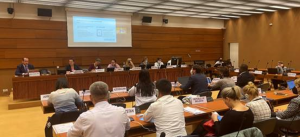The tenth meeting of the Task Force on Public Participation in Decision-making under the Aarhus Convention (Geneva (hybrid), 10–11 October 2022) focused on effective public participation in decision-making in the context of the coronavirus disease (COVID-19) pandemic and on health-related issues linked to air pollution and on urban development. The right to live in a healthy environment is rooted in the Aarhus Convention and is directly linked to the universal right to a clean, healthy and sustainable environment – as recently recognized by the Human Rights Council and the General Assembly. The topics considered by the Task Force were therefore very timely.
It was demonstrated that, despite significant efforts by Governments and civil society to improve legislation and practice to promote public participation, numerous challenges remain. Those challenges need to be addressed, for example, by: strengthening the capacity of public authorities to implement procedures; mitigating existing logistical and administrative barriers for youth; and adapting public participation modalities to cater to the needs of different target groups, in particular, those in vulnerable situations, such as women, the elderly and indigenous communities. Moreover, it was stressed that wars and other forms of military offensives along with natural disasters, inevitably have a negative impact on public participation; thus Governments need to safeguard effective procedures in recovery and reconstruction plans.
The COVID-19 pandemic-driven lockdown helped to technologically empower more people. However, the increased need to acquire new technological skills exacerbated the gender and age gaps. Although the use of digital tools presents new opportunities for wider outreach and for equality regarding online connection, such tools need to be properly regulated to avoid increased surveillance, thus upholding the exercise of human rights. Improvements in legislation and in practical measures, such as legislative amendments and the development of guidance and community engagement applications, are examples of government efforts to address various challenges in the context of the pandemic. In this regard, the advice of the Aarhus Convention Compliance Committee on holding public hearings during the pandemic was timely and valuable.
The importance of public participation in decision-making on health-related issues linked to air pollution was underscored. Several good practices, such as citizen science and crowdsourcing initiatives, deepened the role of the citizen and strengthened public involvement in health-related matters linked to air pollution. Furthermore, the session highlighted the challenges, such as the lack of proper public notification and non-availability of main documents submitted by polluters, and suggested that they could be addressed through increasing the expert and technical capacity of government officials and other target groups, as needed.
Discussions revealed that a number of factors, such as competing interests of different governmental, business and civil society actors, together with barriers regarding cooperation among them and the diversity of public groups living in urban areas, have an impact on public participation in decision-making on urban development. It was also noted that countries with a federal structure experience challenges in implementing a harmonized legislative approach among their territorial entities in order to ensure equal rights in public participation nationwide. At the same time, several examples illustrated that a holistic approach to spatial planning involving participatory processes at different stages, development and application of guidelines and toolkits, as well as stimulation of the use of digital technologies, contributed to enabling public participation in urban development.
Representatives of Armenia, Bulgaria, Bosnia and Herzegovina, Guinea-Bissau, Italy, Kazakhstan, Kyrgyzstan, Lithuania, Slovenia, UN-Habitat, ACTION project, the Right to Clean Air project, the URBiNAT project and the European ECO-Forum shared experiences, good practices and challenges on these issues.
The Task Force, led by Italy, gathered together representatives of States, youth, international and non-governmental organizations (NGOs), Aarhus Centres, international financial institutions, academia and other stakeholders. It is expected that the shared experiences will help to strengthen public participation in decision-making, thereby leading to the effective implementation of the Aarhus Convention and the achievement of the Sustainable Development Goals of the 2030 Agenda for Sustainable Development, specifically Goal 3 and its target 3.9 (substantially reduce the number of deaths and illnesses from hazardous chemicals and air, water and soil pollution and contamination), Goal 11 and its target 11.3 (enhance inclusive and sustainable urbanization and capacity for participatory, integrated and sustainable human settlement planning and management in all countries) and Goal 16 and its target 16.7 (ensure responsive, inclusive, participatory and representative decision-making at all levels).
Meeting web page:
https://unece.org/info/Environmental-Policy/Public-Participation/events/369122
Aarhus Convention: https://unece.org/environment-policy/public-participation
